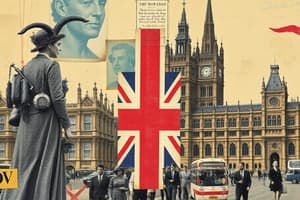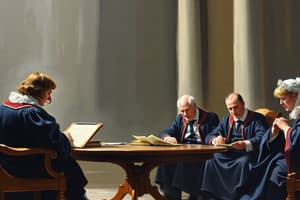Podcast
Questions and Answers
What is the primary source of the UK's constitution?
What is the primary source of the UK's constitution?
- The monarch's prerogative powers
- Statutes, conventions, and EU law (correct)
- Judicial decisions and parliamentary sovereignty
- A single written document
What is the name of the doctrine that states that parliament cannot bind its successors?
What is the name of the doctrine that states that parliament cannot bind its successors?
- Sovereignty of Parliament
- Principle of Non-Intervention
- Principle of Legality
- Doctrine of Implied Repeal (correct)
Which of the following is NOT a characteristic of the UK's constitutional monarchy?
Which of the following is NOT a characteristic of the UK's constitutional monarchy?
- The monarch's role is ceremonial
- The monarch's powers are limited
- The monarch has absolute powers (correct)
- Hereditary succession
What is the purpose of the Parliament Acts 1911 and 1949?
What is the purpose of the Parliament Acts 1911 and 1949?
What is the term used to describe the powers that the monarch exercises on the advice of the prime minister?
What is the term used to describe the powers that the monarch exercises on the advice of the prime minister?
Flashcards
What is the basis of the UK's constitution?
What is the basis of the UK's constitution?
The UK constitution is not written in a single document, but based on a combination of statutes, conventions, and EU law (before Brexit). This means it's a collection of sources rather than one big law book.
Doctrine of Implied Repeal
Doctrine of Implied Repeal
The Doctrine of Implied Repeal states that Parliament has absolute power and can overturn any previous law they made, even if it's not explicitly stated.
UK's Constitutional Monarchy
UK's Constitutional Monarchy
In a constitutional monarchy, the monarch acts as a symbolic head of state, though their powers are limited. They don't have absolute control.
Parliament Acts 1911 and 1949
Parliament Acts 1911 and 1949
Signup and view all the flashcards
Royal Prerogative
Royal Prerogative
Signup and view all the flashcards
Study Notes
Exam Preparation
- Student is in their first year of university in the UK (2023-24 academic year)
- Preparing for a multiple-choice exam in Public Law
- Requested 30 multiple-choice practice questions based on the recommended textbook
Textbook Details
- Book title: Constitutional and Administrative Law by Hilaire Barnett
- Edition: 15
- ISBN: 9781000910650
Note: I'll generate the 30 multiple-choice questions based on the provided textbook. I'll ensure that the answers are accurate and based solely on the textbook.
Studying That Suits You
Use AI to generate personalized quizzes and flashcards to suit your learning preferences.




